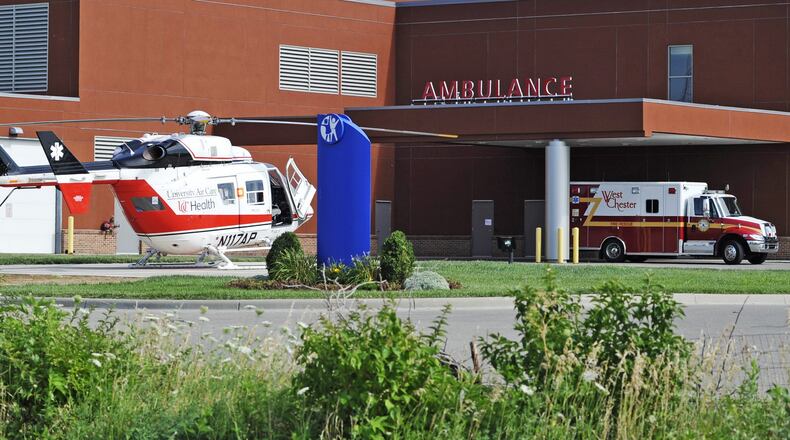The bill was sent in error because the medic didn’t check the box identifying Sanders as a resident. West Chester Twp. doesn’t charge residents directly for emergency transports. A third-party vendor that handles the billing first submits a bill for the service to the person’s insurance or Medicaid (whichever applies), and if the person is a resident, the billing stops there.
RELATED: Butler County fire departments facing staffing issues
Sanders’ mother’s bill was taken care of by the fire chief — she owes nothing — but he is still concerned that erroneous billings could scare people.
“My problem is not exactly with the bill,” he told the Journal-News. “It’s the perception of the residents that need 911 and they are afraid to call because they received a bill and can’t afford it. OK, do I choose between food or the ambulance?”
West Chester Twp. Fire Chief Rick Prinz said the department is working on some protocols and other changes to ensure erroneous billing doesn’t happen again. Officials said the error has occurred only four times since 2014.
Prinz said patients have long been charged for EMS service, but prior to a 2003 law change, hospitals were doing the billing because they provided fire departments with equipment, medications and supplies. He said the existing budget and tax levy cannot shoulder the cost burden alone without compensation for the emergency runs.
“Quite frankly, the cost of medical supplies goes up about 10 to 15 percent every year,” Prinz said. “And our levy would not be sustainable if we did not do this EMS billing. We would have to go back to the residents to approve a levy every three to four years if it wasn’t for this EMS billing.”
Fairfield,Liberty, Hanover, Madison and Ross townships also give residents a break, but Hamilton, Middletown, Oxford and Fairfield Twp. do charge residents for hospital transports.
Hamilton Fire Chief Mark Mercer said of the estimated 14,500 calls they made in the city last year, about 13,000 were for medical emergencies. Those billings brought in a little more than $1.9 million last year to the $10.4 million department budget.
“For the people that we provide EMS service for, there’s an additional cost to have the staffing and supplies and materials,” Mercer said. “Life squads are expensive. We definitely try to recoup, get reimbursement for all of that additional cost that we can.”
MORE: Hamilton spending more on fire services
If Hamilton’s third party vendor fails to retrieve payment from a patient, then the city sends the claim to the state for collection. Most if not all of the other jurisdictions use what is called “soft billing” or expunging of the bill balance after the vendor sends out three bills.
Fairfield Twp. Fire Chief Tim Thomas said soft billing was in place when he took over the department, and he is looking into dissolving the practice.
“I find it confusing because when residents get a bill, some pay it, some don’t,” he said. “I get very confused signals from people because they don’t understand why this person was paying and then when they find out how we bill, I’ve actually had residents call up and want their money back.”
He said he would rather just bill the insurance companies and leave the residential patients out of the equation, so officials can focus on collecting from non-residents.
Just as each department handles billing a little differently, the rates they charge are also not uniform. All the rates must be based on the rates Medicaid puts out every year, according to Trenton Treasurer Mike Engel. The highest rate in the county is in Trenton, with $724 for basic life support and $1,247 for the top tier advanced life support.
The lowest rate for basic support is $471 in West Chester, and Liberty and Ross townships have the highest rate for top tier, at $800.
“Honestly the rates mean absolutely nothing anymore,” Ross Twp. Fire Chief Steve Miller said. “If we charged $2,000 a run, which I wish we could, it’s generally a negotiated term between the insurance company and our billing company.”
About the Author
